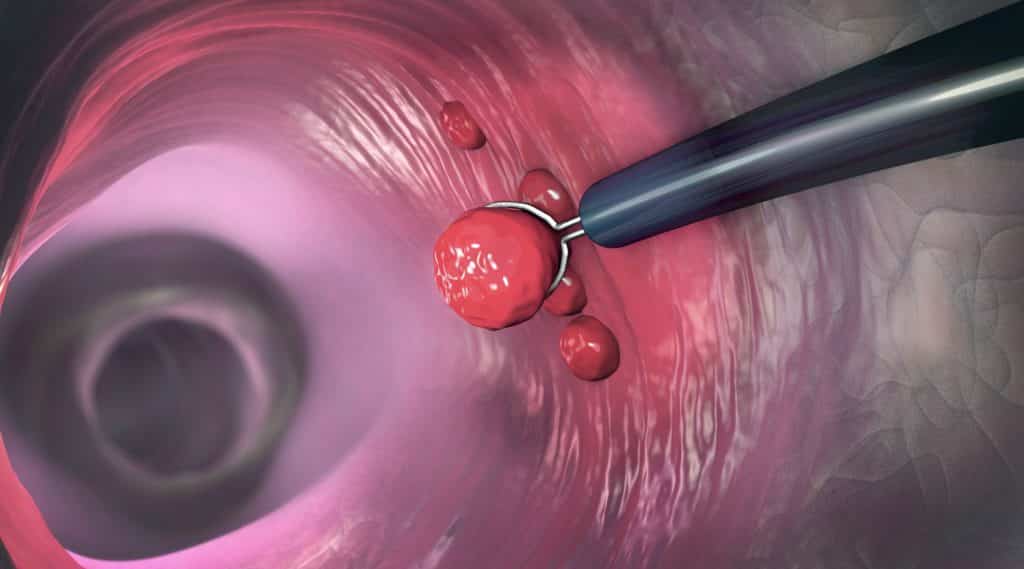They Found Polyps in My Colon. Should I be concerned?

There are more than 37 trillion cells in the human body, and each one divides regularly in order to grow. With numbers this high, some abnormalities can be expected. For as many as 40% of all American adults, these abnormalities can come in the form of small flat bumps or mushroom-like knobs, called polyps.
If you or a loved one is among that 40%, this is what you should know.
What are Polyps, and Where Do They Form?
Polyps are small tissue nodules caused by abnormal cell growth. They are usually benign and non-life-threatening – as long as they are detected and removed. If left to grow, some polyps could eventually develop into cancer.
Polyps can form in many parts of the body, including the nose, throat, stomach, and even ear; however, they are at a higher risk of forming into cancer in the colon. The American Cancer Society projects colorectal cancer will cause nearly 52,580 deaths in 2022.
This risk is likely why colorectal cancer prevention is the focus of a 12-month wellness campaign that was kicked off by World Digestive Health Day on May 29.
Risk Factors for Colon Polyps
The World Digestive Health Day chose colorectal cancer prevention as its 2022 campaign because the risks of developing the disease can be reduced, easily, through early screening and wellness practices. Risks of colon cancer include:
- A family history of colon polyps and cancer as well as hereditary conditions such as Lynch syndrome, which can increase the risk of several cancers including colon cancer.
- Intestinal inflammation disorders, including inflammatory bowel disease (IBD).
- Race – Black Americans have a higher rate of and a 35% greater chance of dying from colorectal cancer than White Americans.
Treating Polyps: A 4-Step Process
Most polyps do not cause symptoms, so testing is essential to detect the growths. This is what to do:
- The most reliable method for catching polyps is a colonoscopy, an internal screening of the large intestine (colon) and rectum. This procedure is recommended for those aged 45 and older, although people at higher risk may need to be tested earlier. (Check with your insurance provider to see when your specific plan begins covering colonoscopies.)
- If polyps or suspicious growths are identified, the gastroenterologist will completely remove them during the screening. This procedure is called a polypectomy. The patient will not feel this.
- The growths are sent to a lab to be tested for cancer. If they are benign, the patient does not have to return for further care, but will be advised to return for a follow-up colonoscopy, likely in five years.
- If the polyps are shown to be cancerous, the physician will determine the course of treatment. Early-stage cancers can potentially be removed with the polyps. Treatments for advanced stages of colon cancer include surgery, chemotherapy, and radiation.
Take Care of Your Cells, Take Care of Your Colon
Regardless of the colonoscopy’s outcome, everyone should strive for a lifestyle that supports a healthier digestive system. Good habits include:
- A healthy diet rich in vegetables, fruits, and high-fiber foods, and low in fatty foods, red meat, and processed meats.
- Keeping active. Moderate exercise – aim for 30 minutes most days of the week – may lower the risk of developing colon cancer, and it supports healthy digestion.
- Maintaining a healthy weight. Extra pounds lead to a higher risk of colon cancer, research has shown.
- Staying well hydrated. Opt for non-sugary, non-alcoholic beverages. Water flushes out impurities and toxins and keeps the digestive track regular.
- Avoiding tobacco smoke. Smoking is a leading cause of all cancers.
Lastly, know that for many people, even a healthy lifestyle might not prevent abnormalities from occurring among those 37 trillion cells. A colon screening is the most reliable way of ensuring your digestive tract is clean of polyps.
If you’d like to request an appointment for a consultation or screening with your gastroenterologist, you can do so here.

